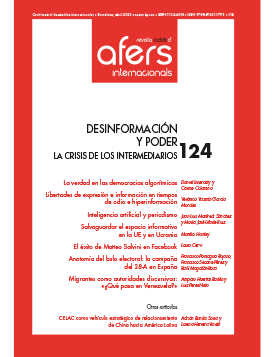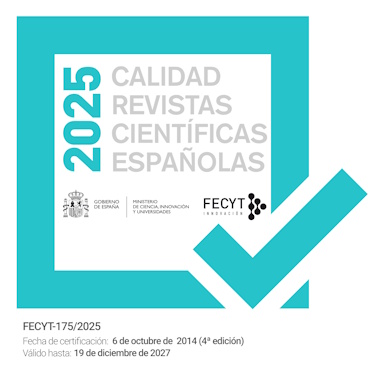Safeguarding the information space: disinformation policies in the EU and Ukraine
Keywords:
desinformación, Ucrania, Unión Europea, resiliencia, alfabetización mediática, intermediación, libertad de expresión, disinformation, Ukraine, European Union, resilience, media literacy, intermediation, freedom of expressionAbstract
Revista CIDOB d’Afers Internacionals, nº 124
Quadrimestral (January -April 2020)
ISSN:1133-6595 | E-ISSN:2013-035X
DOI: doi.org/10.24241/rcai.2020.124.1.73
Those who control the information space control society's ability to form opinions and influence policies. The 2014 riots in Ukraine were the first warning sign of the new challenge presented by disinformation and the capacity of Russian state media to spread lies and misleading images. Ukraine can therefore be considered a testing ground in this regard. Russian disinformation in the EU and Ukraine seeks both to influence society and to discredit institutions, to sow discord and to generate distrust of the media and governments, all of which has helped to erode their democracies. This paper is a comparative study of good practices in the EU and Ukraine for creating societies that are resilient against disinformation, while protecting democracy in the intermediation process.
>> The full text articles of this issue are available only in Spanish language
References
Alandete, David. «How Russian networks worked to boost the far right in Italy». El País, (1 de marzo de 2018) (en línea) [Fecha de consulta: 28.02.2020] https://english.elpais.com/elpais/2018/03/01/inenglish/1519922107_909331.html
Anderson, Janna y Rainie, Lee. «The Future of Truth and Misinformation Online». Pewresearch.org, (19 de octubre de 2017) (en línea) [Fecha de consulta: 01.09.2019] https://www.pewresearch.org/internet/2017/10/19/the-futureof-truth-and-misinformation-online/
Andersson, Jan. «Hybrid operations: lessons from the past». Institute for Security Studies, (28 de octubre de 2015) (en línea) [Fecha de consulta: 15.02.2020] https://www.iss.europa.eu/sites/default/files/EUISSFiles/Brief%2033%20Hybrid%20operations.pdf
Barbera, Pablo; Jost, John; Nagler, Jonathan; Tucker, Joshua y Bonneau, Richard. «Tweeting From Left to Right: Is Online Political Communication More Than an Echo Chamber?». Psychological Science, vol. 26, n.° 10 (2015), p. 1.531-1.542 https://doi.org/10.1177/0956797615594620
Bay, Sebastian. «The Black Market for Social Media Manipulation». NATO StratCom COE, (noviembre de 2018) (en línea) [Fecha de consulta: 18.08.2019] https://www.stratcomcoe.org/black-market-social-media-manipulation
Bayer, Judit; Bitiukova, Natalija; Bárd, Petra; Szakács, Judit; Alemanno, Alberto y Uszkiewic, Erik. Disinformation and propaganda – impact on the functioning of the rule of law in the EU and its Member States. European Union, 2019 (en línea) [Fecha de consulta: 10.02.2020] http://www.europarl.europa.eu/RegData/etudes/STUD/2019/608864/IPOL_STU(2019)608864_EN.pdf
Chan, Man-pui Sally; Jones, Christopher R.; Jamieson, Kathleen Hall y Albarracín, Dolores. «Debunking: A Meta-Analysis of the Psychological Efficacy of Messages Countering Misinformation». Psychological Science, vol. 28, n.° 11 (2017), p. 1.531-1.546 https://doi.org/10.1177%2F0956797617714579
Colleoni, Elanor; Rozza, Alesandro y Arvidsson, Adam. «Echo Chamber or Public Sphere? Predicting Political Orientation and Measuring Political Homophily in Twitter Using Big Data». Journal of Communication, vol. 64, n.° 2 (2014), p. 317-332 https://doi.org/10.1111/jcom.12084
Cooke, Nicole. «Posttruth, Truthiness, and Alternative Facts: Information Behavior and Critical Information Consumption for a New Age». The Library Quartely, vol. 87, n.° 3 (2017), p. 211-221 https://doi.org/10.1086/692298
Council of Europe, Committee of Ministers. «Recommendation n.º R (97) 20 of the Committee of Ministers to Member States on “Hate
Speech”». Council of Europe, (30 de octubre de 1997) (en línea) [Fecha de consulta: 08.07.2019] https://search.coe.int/cm/Pages/result_details.aspx?ObjectID=0900001680505d5b
Desir, Harlem. «OSCE Media Freedom Representative concerned by several
provisions of Ukraine’s new draft law on disinformation». OSCE, (23 de enero de 2020) (en línea) [Fecha de consulta: 11.02.2020] https://www.osce.org/representative-on-freedom-of-media/444673
Donahue, Eileen. «Protecting Democracy from Online Disinformation Requires Better Algorithms, Not Censorship». Council on Foreign Relations, (21 de Agosto de 2017) (en línea) [Fecha de consulta: 12.08.2019] https://www.cfr.org/blog/protecting-democracy-online-disinformation-requires-betteralgorithms-not-censorship
EU vs. Disinfo. «The EU’s Camps in Ukraine: A Case of Proactive Disinformation». euvsdisinfo.eu, (15 de abril de 2019) (en línea) [Fecha de consulta: 08.07.2019] https://euvsdisinfo.eu/the-eus-camps-in-ukraine-a-case-ofproactive-disinformation/
EU vs. Disinfo. «Poland, the Baltic States, and Ukraine are Infected by Russophobia». euvsdisinfo.eu, (24 de enero de 2020) (en línea) [Fecha de consulta: 12.02.2020] https://euvsdisinfo.eu/report/poland-the-baltic-states-andukraine-are-infected-by-russophobia/
European Commission. «Fake News and Disinformation Online: Flash Barometer 464». ec.europa.eu, (2018c) (en línea) [Fecha de consulta : 29.11.2019] https://www.europarl.europa.eu/RegData/etudes/STUD/2019/624278/EPRS_STU(2019)624278_EN.pdf
European Commission. «Tackling Online Disinformation». ec.europa.eu, (13 de septiembre de 2019) (en línea) [Fecha de consulta: 09.08.2019] https://ec.europa.eu/digital-single-market/en/tackling-online-disinformation
European Commission. «A Strategic Approach to Resilience in the EU’s external action». ec.europa.eu, (7 de junio de 2017) (en línea) [Fecha de consulta:09.07.2019] https://eeas.europa.eu/sites/eeas/files/join_2017_21_f1_communication_from_commission_to_inst_en_v7_p1_916039.pdf
European Commission Report. «Fake news and disinformation online». ec.europa.eu, (2018a) (en línea) [Fecha de consulta: 08.07.2019] https://ec.europa.eu/commfrontoffice/publicopinion/index.cfm/survey/getsurveydetail/instruments/flash/surveyky/2183
European Commission Report. «Action Plan Against Disinformation». ec.europa. eu, (2018b) (en línea) [Fecha de consulta: 08.07.2019] https://ec.europa.eu/commission/sites/beta-political/files/eu-communication-disinformation-euco-05122018_en.pdf
European Parliament. «Motion for a resolution to wind up the debate on the statements by the Council and the Commission pursuant to Rule 132(2) of the Rules of Procedure on foreign electoral interference and disinformation in national and European democratic processes». European Parliament, (2019) (en línea) [Fecha de consulta: 26.04.2020] https://www.europarl.europa.eu/doceo/document/B-9-2019-0108_EN.html
Fedorchuk, Orysya. «Freedom of Media in Ukraine». Council of Europe, (2016) (en línea) [Fecha de consulta: 30.06.2019] https://www.coe.int/en/web/kyiv/freedom-of-media-in-ukraine
Flaxman, Seth; Goel, Sharad y Rao, Justin. «Filter Bubbles, Echo Chambers, and Online News Consumption». Public Opinion Quarterly, vol. 80, n.° s1 (2016), p. 298-320 https://doi.org/10.1093/poq/nfw006
Flore, Massimo; Balahur, Alexandra; Podavini, Aldo y Verile, Marco. Understanding Citizens’ Vulnerabilities to Disinformation and Data-Driven Propaganda.
Luxenburgo: EU, 2019 (en línea) [Fecha de consulta: 01.09.2019] https://publications.jrc.ec.europa.eu/repository/bitstream/JRC116009/understanding_citizens_vulnerabilities_to_disinformation.pdf
Froehlich, Thomas. «A Not-So-Brief Account of Current Information Ethics: The Ethics of Ignorance, Missing Information, Misinformation,
Disinformation and Other Forms of Deception or Incompetence». BiD: textos universitaris de biblioteconomia i documentació, n.° 39 (2017) (en línea) [Fecha de consulta: 12.02.2020] http://bid.ub.edu/pdf/39/en/froehlich.pdf
Grinberg, Nir; Joseph, Kenneth; Friedland, Lisa; Swire-Thompson, Briony y Lazer, David. «Fake News on Twitter During the 2016 U.S. Presidential Election». Science, vol. 363, n.° 6425 (2019), p. 374-378 https://science.sciencemag.org/content/363/6425/374
Grushetsky, Anton; Kruglashov, Andrii y Lygachova, Natalia. Opposition to Russian Propaganda and Media Literacy: Results of All-Ukrainian Opinion Poll. Analytical Report. Kiev: Detector Media, 2018 (en línea) https://detector.media/doc/images/news/archive/2016/136017/DM_KMIS_engl__WEB-2.pdf
Hobbs, Renee y Frost, Richard. Measuring the Acquisition of Media-Literacy Skills. Reading Research Quarterly, vol. 38, n.° 3 (2003), p. 330-355 https://www.jstor.org/stable/4151822
Ignatidou, Sophia. EU–US Cooperation on Tackling Disinformation. The Royal Institute of International Affairs, research paper, (septiembre de 2019) (en línea) [Fecha de consulta: 28.02.2020] https://www.chathamhouse.org/sites/default/files/2019-10-03-EU-US-TacklingDisinformation.pdf
Ireton, Cherilyn y Posetti, Julie. Journalism, Fake News, and Disinformation: Handbook for Journalism Education and Training. UNESCO, Series on Journalism Education, (2018) (en línea) [Fecha de consulta: 20.07.2019] https://en.unesco.org/sites/default/files/journalism_fake_news_disinformation_print_friendly_0.pdf
Jang, Jeong-woo; Lee Eun-Ju y Yun, Soo Shin. «What Debunking of Misinformation Does and Doesn’t». Cyberpsychology, Behavior, and Social Networking, vol. 22, n.° 6 (2019), p. 423-427 http://doi.org/10.1089/cyber.2018.0608
Jankowicz, Nina. «Ukraine’s Election is an All-out Information Battle». The Atlantic, (17 de abril de 2019) (en línea) [Fecha de consulta: 30.06.2019] https://www.theatlantic.com/international/archive/2019/04/russia-disinformation-ukraine-election/587179/
Kelly, Sanja; Truong, Mai; Shahbaz, Adrian; Earp, Madeline y White, Jessica. «Freedom on the Net 2017: Manipulating Social Media to Undermine Democracy». Fredoom House, (13 de noviembre de 2017) (en línea) [Fecha de consulta: 15.08.2019] https://freedomhouse.org/report/freedom-net/2017/manipulating-social-media-undermine-democracyh
KIIS-Kiev International Institute of Sociology Report. «Index of Russian Propaganda Efficiency». Kiev International Institute of Sociology, (25 de marzo de 2015) (en línea) http://www.kiis.com.ua/?lang=eng&cat=reports&id=510
Kornbluh, Karen. «Could Europe’s New Data Protection Regulation Curb Online Disinformation?». Council on Foreign Relations, (20 de febrero de 2018) (en línea) [Fecha de consulta: 29.06.2019] https://www.cfr.org/blog/could-europes-new-data-protection-regulation-curb-online-disinformation
Kunda, Ziva. «The Case for Motivated Reasoning». Psychological Bulletin, vol. 108, n.° 3 (1990) 480-498 https://doi.org/10.1037/0033-2909.108.3.480
Leetaru, Kalev. «In Less Than a Decade Twitter Has Gone From Empowering Democratic Activists To Silencing Them». Forbes, (6 de junio de 2019) (en línea) [Fecha de consulta: 11.02.2020] https://www.forbes.com/sites/kalevleetaru/2019/06/06/in-less-than-a-decade-twitter-has-gone-from-empoweringdemocratic-activists-to-silencing-them/
Maksak, Hennadiy; Shelest, Hanna; Bureiko, Nadiia; Koval, Nadiia y Koval, Maria. Ukraine Prism: Foreign Policy 2017. Kiev: Friedrich Ebert Foundation, 2018 (en línea) [Fecha de consulta: 13.07.2019] http://prismua.org/wp-content/uploads/2018/04/A5-prizma2017_eng_web.pdf
Murrock, Erin; Amulya, Joy; Druckman, Mehri y Liubyva, Tetiana. «Winning the War on State-Sponsored Propaganda: Results from an Impact Study of a Ukrainian News Media and Information Literacy Program». Journal of Media Literacy Education, vol. 10, n.° 2 (2018), p. 53-85 (en línea) [Fecha de consulta: 18.08.2019] https://digitalcommons.uri.edu/jmle/vol10/iss2/4/Polyakova, Alina y Fried, Daniel.
«Democratic Defense against Disinformation 2.0». Atlantic Council, (13 de junio de 2019) (en línea) [Fecha de consulta :
Polyakova, Alina y Gonzalez, Geysha. «The U.S. anti-smoking campaign is a great model for fighting disinformation». Washington Post, (4 de agosto de 2018) (en línea) [Fecha de consulta: 11.07.2019] https://www.washingtonpost.com/
news/democracy-post/wp/2018/08/04/the-u-s-anti-smoking-campaign-is-agreatmodel-for-fighting-disinformation/?utm_term=.68e671b5e3e3
Presidential Decree. «Updated Sanctions and Blocking of 192 Websites in Ukraine». The Presidential Office of Ukraine, (2018) (en línea) [Fecha de consulta:12.07.2019] http://www.president.gov.ua/documents/1332017-21850
Silver, Laura. «Younger Europeans are far more likely to get news from social media». Pew Research Center, (30 de octubre de 2018) (en línea) [Fecha de consulta: 15.08.2019] https://www.journalism.org/2018/10/30/youngereuropeans-are-far-more-likely-to-get-news-from-social-media/
Snegovaya, Maria. «Putin’s Information Warfare in Ukraine: Soviet Origins of Russia’s Hybrid Warfare». Institute for the Study of War, (septiembre de 2015) (en línea) [Fecha de consulta: 11.08.2019] http://www.understandingwar.org/report/putins-information-warfare-ukraine-soviet-origins-russias-hybrid-warfare
Talant, Bermet. «Ukraine’s new TV channel aims to counter Russian propaganda in the Donbas». Kyiv Post, (24 de enero de 2020) (en línea) [Fecha de consulta: 13.02.2020] https://www.kyivpost.com/ukraine-politics/ukrainesnew-tv-channel-aims-to-counter-russian-propaganda-in-the-donbas.html
Tetlock, Phillip. Expert Political Judgement: How Good Is It? Princeton, NJ: Princeton University Press, 2005.
Tomilenko, Sergiy. «Ukraine: journalists’ union rejects new draft law on disinformation». European Federation of Journalist, (22 de enero de 2020) (en línea) [Fecha de consulta: 10.02.2020] https://europeanjournalists.org/blog/2020/01/22/ukraine-journalists-union-rejects-new-draft-law-on-disinformation
Vandystadt, Nathalie. «Code of Practice against disinformation: Commission calls on signatories to intensify their efforts». ec.europa.eu, (29 de enero de 2019) (en línea) [Fecha de consulta: 01.09.2019] https://ec.europa.eu/commission/presscorner/detail/it/MEMO_19_752
Zollo, Fabiana; Bessi, Alessandro; Del Vicario, Michela; Scala, Antonio; Caldarelli, Guido; Shekhtman, Louis; Havlin, Shlomo y Quattrociocchi, Walter. «Debunking in a world of tribes». PlosOne, vol. 12, n.° 7 (2017) (en línea) [Fecha de consulta: 10.02.2020] https://doi.org/10.1371/journal.pone.0181821













